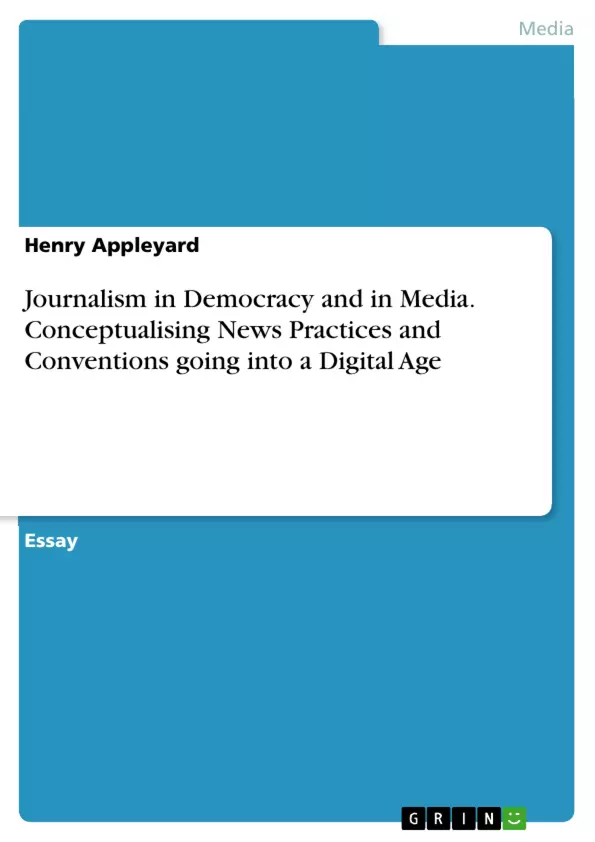The methodology of journalism and its professional application in contemporary media are at a crossroads; ‘its institutional structures, its practices, its role and its perception by the public are all in flux’. On the one hand, journalism is an ancient academic ‘textual system’ that has a symbiotic relationship with history and law; ‘a hybrid, interdisciplinary mix of the humanities and the social sciences’. On the other hand, journalism is a profession evolving out of, and alongside communication advancements, ‘created by the industrial and bourgeois political revolutions of the 18th and 19th centuries and fully institutionalised in the mass media’. These differences are realised in the convergence of different practises and conventions applied in the ‘third wave’ of the internet, where ‘every part of our lives will inevitably rely on an internet connection’.
Inhaltsverzeichnis (Table of Contents)
- The Discipline of Journalism in Democracy...
- The Professionalization of Journalists in Media…........
- Online Convergence and Divergence.
Zielsetzung und Themenschwerpunkte (Objectives and Key Themes)
This essay aims to explore the critical dialectic of journalism as both a democratic discipline and an institutional media profession. It examines the evolving nature of journalism in the digital age, particularly the convergence of different practices and conventions in the "third wave" of the internet.
- The historical evolution of journalistic practices and conventions
- The role of journalism in promoting democracy and accountability
- The impact of the internet and digital media on journalism
- The rise of citizen journalism and its implications for the profession
- The potential for journalism to foster global citizenship and address global issues
Zusammenfassung der Kapitel (Chapter Summaries)
The first chapter delves into the origins of journalism as a discipline, tracing its roots back to Thucydides and his emphasis on objective and scientific reporting. It examines the key principles of journalistic practice, including evidence, interpretation, and narrative. The chapter also discusses the role of journalism in promoting democracy and accountability, highlighting its function as a watchdog and the fourth estate.
The second chapter focuses on the professionalization of journalists in media, exploring how journalism has evolved alongside communication advancements. It examines the convergence of different practices and conventions in the digital age and the impact of the internet on the profession. The chapter also discusses the rise of citizen journalism and its implications for traditional media.
Schlüsselwörter (Keywords)
The key terms and concepts explored in this essay include journalism, democracy, media, digital age, convergence, divergence, citizen journalism, global citizenship, and the "third wave" of the internet.
Frequently Asked Questions
How is journalism defined as a democratic discipline?
Journalism acts as a "fourth estate" or watchdog, promoting accountability and providing the information necessary for a functioning democracy.
What is the "third wave" of the internet in journalism?
It refers to the current era where ubiquitous internet connectivity converges different media practices and conventions into a digital-first environment.
What is citizen journalism?
Citizen journalism involves non-professional individuals collecting, reporting, and analyzing news, often enabled by social media and digital tools.
How has the digital age impacted journalistic conventions?
Institutional structures and news practices are in flux, shifting from traditional print/broadcast models to interactive, immediate, and global digital formats.
What are the core principles of journalistic practice?
Key principles include objective reporting, evidence-based interpretation, narrative structure, and a commitment to truth and public interest.
- Arbeit zitieren
- Henry Appleyard (Autor:in), 2016, Journalism in Democracy and in Media. Conceptualising News Practices and Conventions going into a Digital Age, München, GRIN Verlag, https://www.grin.com/document/358128



